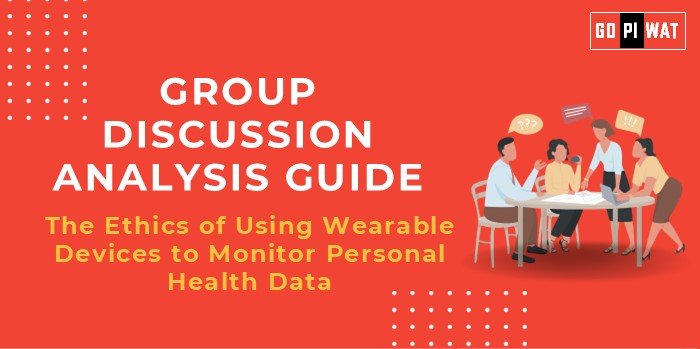📋 Group Discussion (GD) Analysis Guide: The Ethics of Using Wearable Devices to Monitor Personal Health Data
🌐 Introduction to the Topic
Opening Context: The proliferation of wearable health devices, such as smartwatches and fitness trackers, has revolutionized personal health management. They offer real-time data, aiding in preventive care and personalized treatments. However, ethical questions around privacy, consent, and data use have come to the forefront.
Topic Background: The market for wearables is booming, driven by advancements in IoT and AI. These devices track metrics like heart rate, sleep patterns, and activity levels. While beneficial for users and healthcare providers, concerns over data security and commercialization of sensitive health information are growing.
📊 Quick Facts and Key Statistics
- 🌍 Global Market Size: $62 billion in 2023, projected to grow at 15% CAGR (Source: Grand View Research).
- 📈 Adoption Rate: 1 in 5 adults globally use wearables (2023 survey by Pew Research).
- ⚠️ Privacy Incidents: 45% of users express concerns over data misuse (Source: IDC Report).
- 🩺 Healthcare Impact: Wearables reduce hospital visits by 30% through early detection of health issues (Source: WHO).
👥 Stakeholders and Their Roles
- 👤 Consumers: Primary users benefiting from personalized health insights.
- 🩺 Healthcare Providers: Use aggregated data for research and personalized care plans.
- 💻 Tech Companies: Develop and sell devices, with responsibilities for data security.
- 🏛️ Regulators: Enforce laws on data protection, such as GDPR and HIPAA.
- 💼 Insurance Companies: Utilize data for risk assessment and policy customization.
🏆 Achievements and Challenges
Achievements:
- ✨ Enhanced Preventive Care: Devices enable early detection of conditions like arrhythmias.
- 🌍 Global Reach: Affordable models expand access in developing countries.
- 📡 Integration with Telemedicine: Streamlines patient monitoring remotely.
Challenges:
- ⚠️ Data Privacy Risks: High-profile breaches, such as Fitbit’s data exposure in 2022.
- ⚖️ Ethical Dilemmas: Employers and insurers using health data for discrimination.
- 📋 Regulatory Gaps: Limited global standards for health data management.
🌏 Global Comparisons:
- 🇺🇸 USA: Robust adoption but ongoing privacy lawsuits (e.g., MyFitnessPal breach).
- 🇪🇺 Europe: GDPR compliance sets a high standard for data protection.
- 🇨🇳 China: Advanced AI in wearables, but less stringent privacy norms.
📚 Structured Arguments for Discussion
- ✅ Supporting Stance: “Wearables democratize healthcare, offering real-time insights that save lives.”
- ❌ Opposing Stance: “The risks of data misuse and lack of informed consent outweigh the benefits.”
- ⚖️ Balanced Perspective: “While wearables advance healthcare, stronger regulations are essential to mitigate ethical concerns.”
🎯 Effective Discussion Approaches
- 💡 Opening Approaches:
- “Global adoption of wearables raises profound ethical concerns regarding user data privacy.”
- “Wearables revolutionize preventive care, but are we sacrificing privacy for convenience?”
- 🛠️ Counter-Argument Handling:
- Recognize privacy concerns and propose solutions like blockchain for data security.
🔍 Strategic Analysis of Strengths and Weaknesses
Strengths:
- 🌐 Accessibility
- 🩺 Preventive care
- 🔗 Integration with healthcare systems
Weaknesses:
- 🔒 Data security risks
- 💸 Affordability concerns
Opportunities:
- 🤖 AI-powered insights
- 🤝 Partnerships with healthcare providers
Threats:
- ⚖️ Regulatory crackdowns
- 📉 Consumer mistrust
🎓 Connecting with B-School Applications
- 🌟 Real-World Applications: Topics for case studies in business ethics, AI in healthcare, and product innovation.
- ❓ Sample Interview Questions:
- “How would you address privacy concerns in wearable technology?”
- “Discuss the ethical implications of insurers using wearable data.”
- 📘 Insights for B-School Students:
- Explore intersections of tech and healthcare ethics.
- Study successful and failed cases in wearable data handling.


